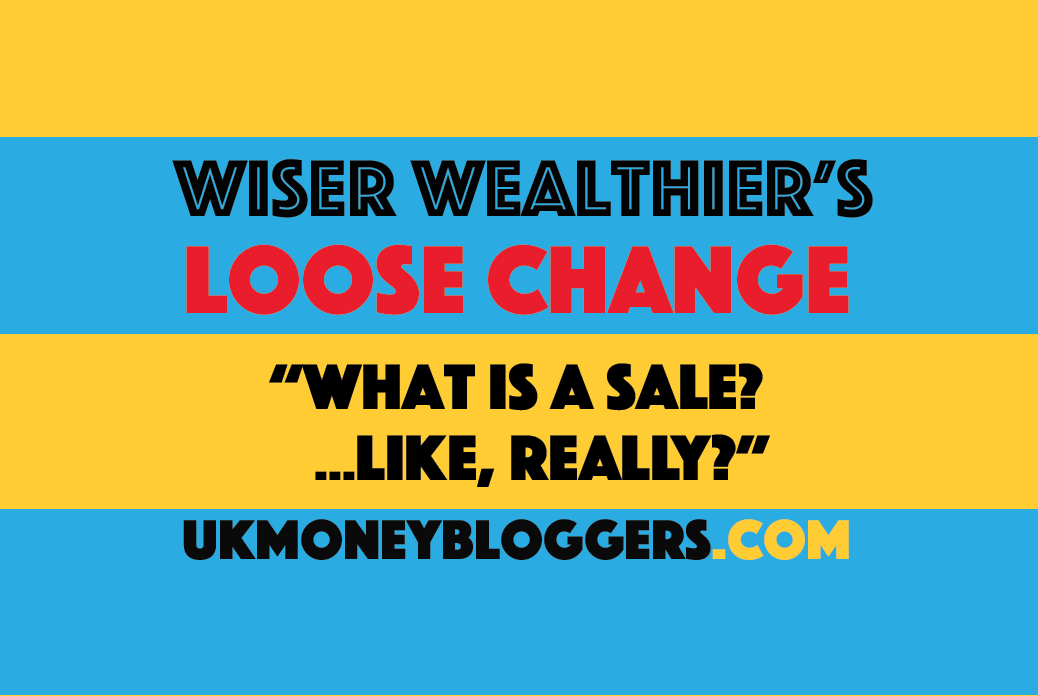Each week a money blogger gets to share a few home truths. This week it’s Carl Lincoln from Wiser Wealthier, who is giving his Loose Change. Carl thinks you’re being hoodwinked by special offers.
You probably think you know what a sale is, right?
Put very simply it’s a time when things are cheaper than they usually would be and, as any of my fellow money bloggers would attest, getting something cheaper is ALWAYS better than paying full price.
What I would like to do (without getting into psychology and all that stuff) is to deconstruct sales a little bit in order to try and help you make some better financial choices, especially during this most relentless and tempting of times when we go from Black Friday to Cyber Monday, pre-Xmas deals, post-Xmas deals and new year sales within just a few months.
Here’s four things about sales that you might not have thought about:
1. Loss leaders
If you’re reading this you don’t need me to explain what a loss leader is. All I’m going to do is suggest you remember this whenever you’re lured in to a sale.
If you find yourself straying from the discount rail or yellow sticker shelf, they’ve won!
2. Why is something on sale?
If something had sold at full price there would be no need for a discount or sale!
There are two main reasons something is on sale:
- No one wanted it the first time
- It’s damaged.
I much prefer option 2 items because sometimes ‘damage’ just means anything out of the manufacturer’s specification and often it won’t actually matter when you’re wearing, using eating it etc. Also it might be the packaging that is damaged – these are the BEST bargains! Think dented tins in the supermarket, ripped labels on clothing or scratched boxes on electronics.
(Aside: remember your rights might be different if you know about the defect when purchasing!)
3. Sales are there to make you buy NOW
Another reason businesses have sales is for cashflow. If things are looking like they’re dipping a quick sale will boost the turnover figures in the short term and get some of the crappy products off the shelves.
This means that they want to incentivise you to buy things straight away.
Think ‘One day only’, ‘Offer ends tonight’, ‘Don’t miss…’ etc.
Of course it follows that the promotion around the sale will be geared towards creating a sense of urgency and this makes you much more likely to impulse buy!
My advice on this is simple (like all my advice): Buying something you never use is much worse than missing out on a deal. If you spend £10 rather than £25 on something and never use it you haven’t saved £15, you’ve spent £10 that you could have put to better use!
4. Generic sales don’t offer the best deals
Given the timing of this article I thought I should write something about Black Friday (the same applies for New Year and other generic ‘shopping holidays’ too – HATE that phrase by the way!)
Certain products are suited to sales at certain times. I.e. clothing towards the end of the season, gym memberships in the new year and fruit when it’s nearing the sell by date.
With a generic sale like Black Friday everyone feels the need to jump on board just because it’s expected of them and therefore probably won’t offer their biggest reductions.
Generic events are a GOOD time to get GOOD deals, don’t be fooled into thinking they’re the BEST time to get the BEST deals or even a GOOD time to get the BEST deals.
I hope that little delve into sales and discounts will help you to think differently next time you feel the magnetic pull of the bright red and yellow boards.
You can read more of Carl’s blog posts, including on the topic of Black Friday at Wiser Wealthier. Plus you can talk to Carl on Twitter, Snapchat or Instagram.
Here’s Carl’s reposonses to our recent #MondayMoneyUK Twitter chat about Black Friday

